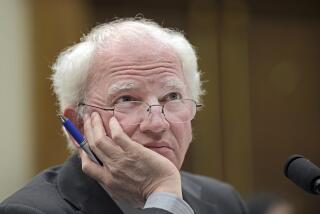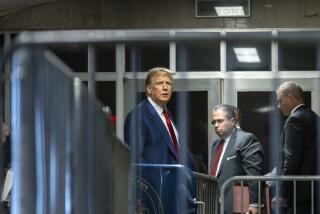Must Reads: Stormy Daniels lawyer Michael Avenatti tested legal boundaries as his firm maneuvered into bankruptcy
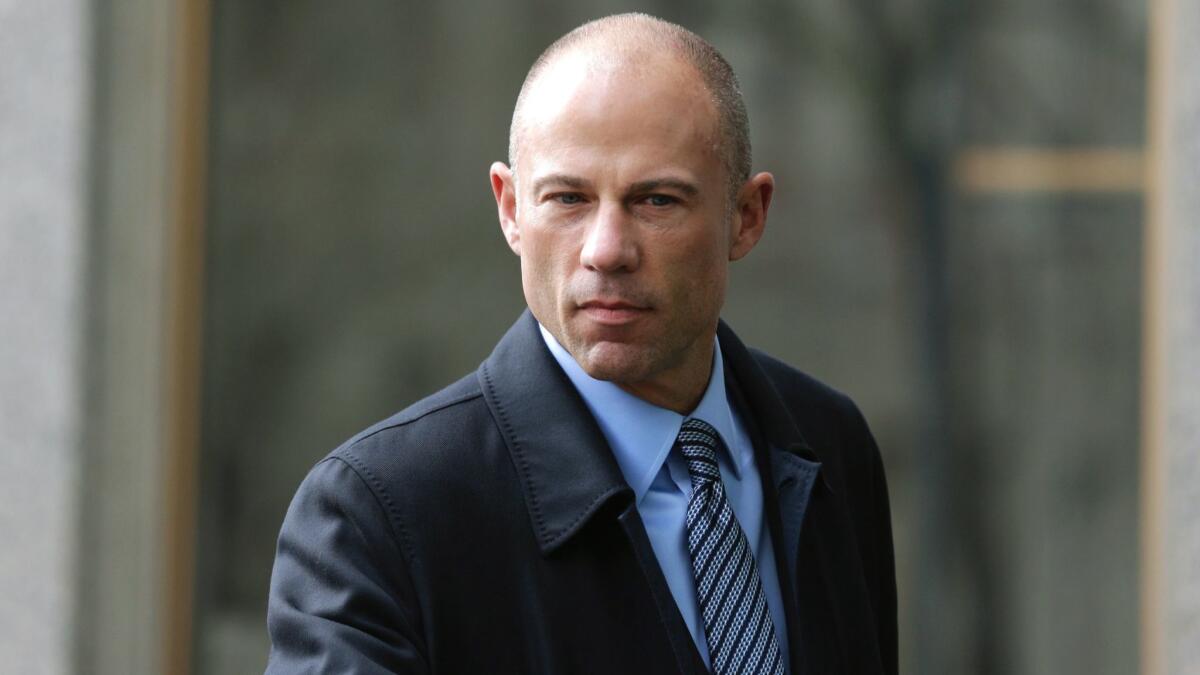
Michael Avenatti was caught in a downward spiral of financial trouble last year when Jerry Tobin, an unlikely savior, came to the rescue.
Tobin, who has a long arrest record and sports a mohawk in his mug shots, showed up at a UPS Store in Orlando, Fla., put down two $100 bills and rented a mailbox.
The next day, using his new anonymous address, Tobin filed a court petition to force Avenatti’s Newport Beach law firm into bankruptcy. The firm, Eagan Avenatti, owed him $28,700, Tobin claimed.
It was just what Avenatti needed, exactly when he needed it.
The bankruptcy triggered an automatic halt to a nasty, high-stakes arbitration between Avenatti’s firm and Jason Frank, a lawyer who used to work there. If Eagan Avenatti were to lose, it could be forced to pay Frank more than $14 million.
U.S. Bankruptcy Judge Karen Jennemann immediately questioned whether Eagan Avenatti was colluding with Tobin on a bad-faith bankruptcy aimed at stalling the arbitration — or “just got plain lucky.”
She dismissed Tobin as a “screwy small creditor” who couldn’t, on his own, figure out how to initiate the rarely used involuntary bankruptcy process.
“We have an involuntary case that has a stench of impropriety,” she said.
Avenatti, who would vault to fame a year later as the attorney for porn star Stormy Daniels, denied the firm played any part in Tobin’s petition.
The story of how Avenatti ran his firm as it maneuvered into bankruptcy tells a lot about the way he operates, testing legal and ethical boundaries. He owns 75% of Eagan Avenatti; 25% belongs to San Francisco lawyer Michael Eagan.
The firm’s bankruptcy ended in March, but its failure to honor the settlement terms has proved costly.
Eagan Avenatti was hit with a $10-million judgment last week after Avenatti broke his promise to start paying $5 million to Frank, who alleged in arbitration that the firm cheated him out of his earnings.
Michael Cohen, the lawyer who paid Daniels to keep quiet about her alleged affair with Donald Trump, cited the judgment in urging a judge to reject Avenatti’s request to participate in a New York court dispute over FBI raids on Cohen’s home, office and hotel room.
Avenatti withdrew the request Wednesday after the judge told him he’d have to stop his “publicity tour.” With scathing rhetorical assaults on Cohen and the president, Avenatti, 47, has been a constant presence on cable news in the three months since he filed Daniels’ suit to void her nondisclosure pact.
His tactics have stirred controversy, most recently his release of a report about Cohen’s private banking records. It mistakenly included transactions of men named Michael Cohen who had nothing to do with Trump.
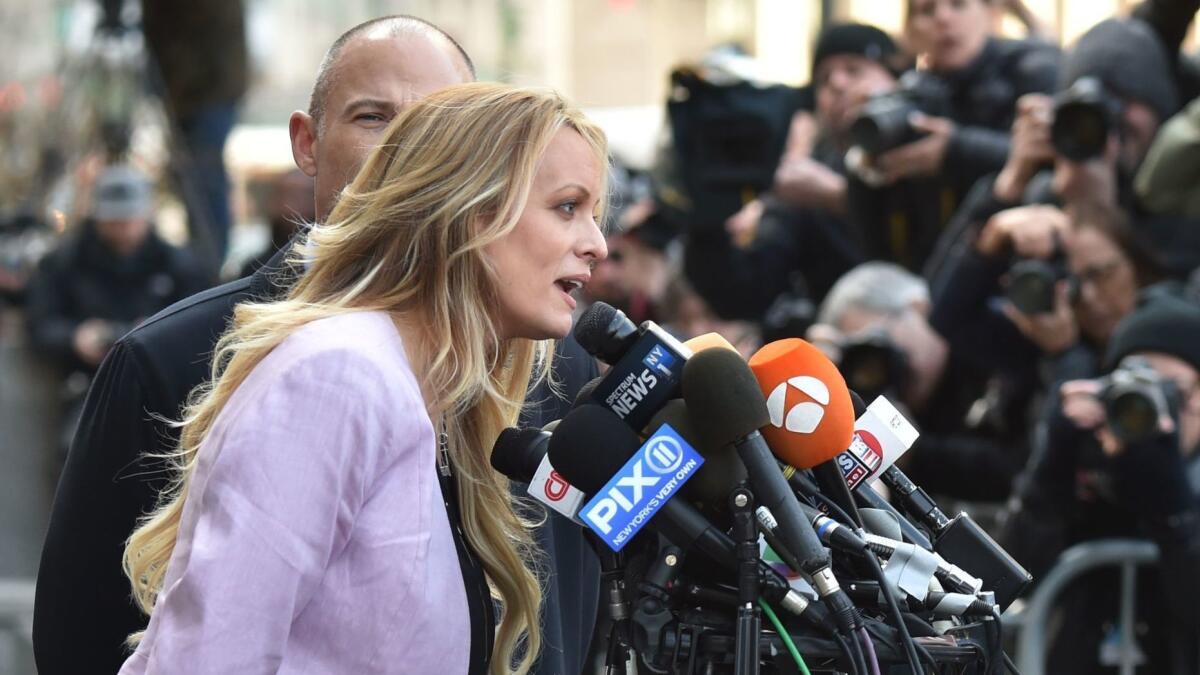
In the years before its bankruptcy, Eagan Avenatti was a lucrative law practice. Its tens of millions of dollars in legal fees helped Avenatti fund what his wife, in divorce papers, called a lavish personal lifestyle.
The couple rented a bayfront house on Lido Isle for $100,000 a month. Avenatti drove a Ferrari. He bought a Honda jet for short-distance travel. He spent millions to acquire Tully’s Coffee, a troubled Seattle chain.
The cost of running the nine-lawyer firm is high — more than $300,000 a month to sustain its payroll, rent and other expenses, bankruptcy court records show.
It’s a plaintiffs’ firm that takes cases mostly on contingency, so its income is erratic. Months pass with minimal revenue, then a verdict or settlement produces a sudden windfall.
One of the firm’s biggest payouts came in 2014, when Eagan Avenatti reached a $35.3-million settlement for more than 7,000 class-action clients who sued Service Corporation International, the owner of Eden Memorial Park cemetery in Mission Hills.
The cemetery, the suit alleged, crammed graves too close together, disturbing and discarding buried human remains.
The settlement included $23.5 million in legal fees and costs for Eagan Avenatti.
The firm was required to share some of the money with Frank, the lead lawyer on that case. But it didn’t, said Frank, who alleged fraud in the arbitration case that he eventually filed.
In May 2016, Frank and two other lawyers bolted Eagan Avenatti and launched their own practice in Irvine. They took 17 clients with them.
For Avenatti, the loss of clients was one of many sources of mounting financial pressure.
By early 2017, Tully’s Coffee — Avenatti was the majority owner — was collapsing. Landlords were evicting Tully’s outlets and suing for back rent. Liens were piling up as Tully’s left more than $5 million in taxes unpaid. A law firm hired by Avenatti to defend Tully’s had to sue the coffee chain to get its bills paid.
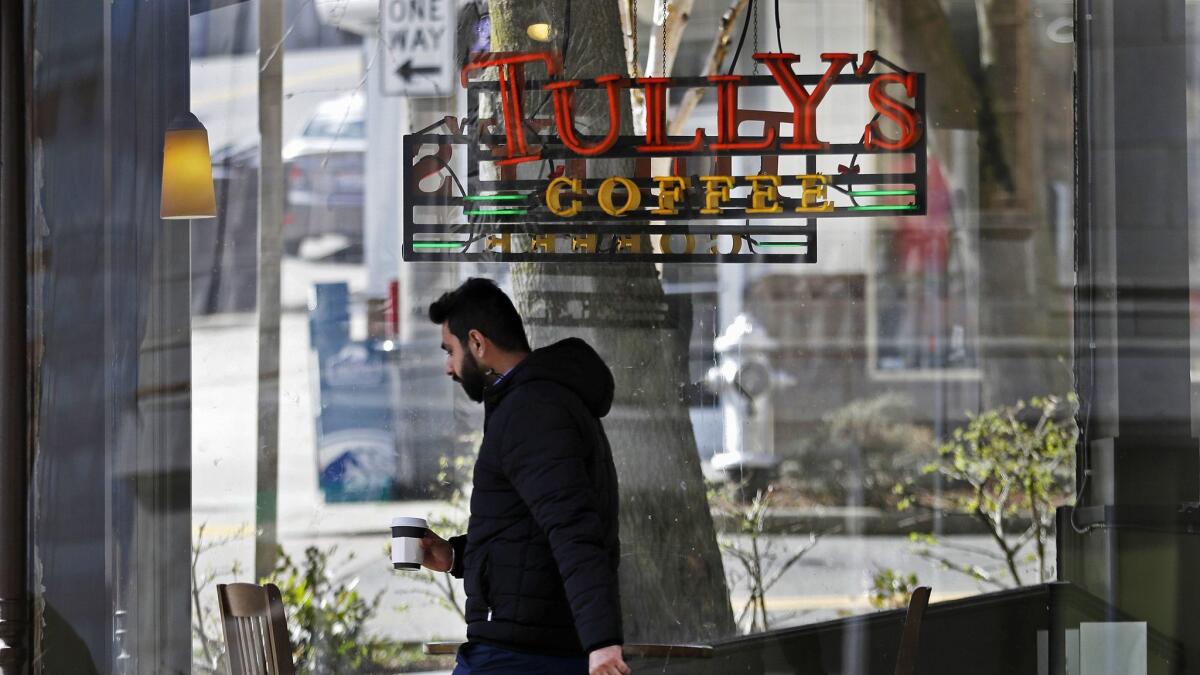
At the same time, Eagan Avenatti also was falling delinquent in its payroll taxes, court records show. And the Internal Revenue Service put a $904,000 lien on Avenatti’s personal property for his failure to pay 2009 and 2010 personal income taxes. (Avenatti said the lien was placed in error.)
One of the biggest financial threats to Eagan Avenatti was the Frank arbitration.
The arbiters, three retired judges in Los Angeles, told the firm to give Frank the financial records he needed to calculate his share of its profits, then sanctioned Eagan Avenatti for defying their orders.
The firm’s claim that it couldn’t find its 2013, 2014 and 2015 tax returns “stretches the bounds of credibility,” the retired judges ruled.
On Feb. 10, 2017, the panel excoriated Eagan Avenatti for stonewalling. Avenatti denied wrongdoing, but with the final arbitration hearing just a month away, all signs pointed to a finding against the firm.
Four days later, Avenatti took a gamble in a reach for quick cash. He filed an emergency request for an extra $3.4 million in payments to Eagan Avenatti from the cemetery settlement fund even though the firm already had received its entire $23.5-million share.
More payments to Eagan Avenatti would require reducing the payouts to its thousands of clients.
After one California judge turned him down, Avenatti went to another and won a court order approving the payment. Avenatti assured both judges that he’d alerted other parties in the case to his request. Both times, no other party showed up to challenge his request for the money, court documents show.
It took nearly a month for the cemetery owner to discover what Avenatti had done.
“I was shocked,” the company’s attorney, Steven Gurnee, said when he asked the court to vacate the order.
In the end, Avenatti signed a court statement admitting he never notified the other parties that he was seeking the money. The court’s order authorizing the $3.4-million payment to Eagan Avenatti was withdrawn.
In response to written questions from the Los Angeles Times, Avenatti said, “We had substantial justification for what we filed and the court found nothing wrong with it.
“Our clients have received every penny they are entitled to,” he said. “Every penny.”
As Avenatti was trying to get more money from the cemetery case, final hearings in the Frank arbitration were drawing near.

Avenatti’s scheduled testimony was just two days away when Tobin filed the bankruptcy petition on March 1, 2017.
“Gentlepeople, the depositions will not be proceeding tomorrow in light of the attached,” Avenatti’s attorney, Phillip Baker, told Frank and his lawyers in an email with the bankruptcy papers.
Stunned, Frank asked the bankruptcy judge for an urgent order allowing the arbitration to proceed. Tobin’s petition, he alleged, seemed designed to help Eagan Avenatti dodge arbitration.
The judge, Jennemann, agreed that the case looked illegitimate. Calling it a “stinky involuntary,” she said, “I’ve never had anything like this happen before.”
Jennemann gave Eagan Avenatti an unusually short deadline to consent to the bankruptcy — less than 48 hours. The Frank arbitration would proceed as scheduled unless the firm agreed to Chapter 11 protection from its creditors, she ruled.
On its face, Tobin’s petition appeared to be on weak legal footing; an involuntary bankruptcy normally requires at least three creditors to join forces.
Yet Eagan Avenatti made no effort to have it dismissed. Instead, it told the court it was indeed unable to pay its bills and needed to enter bankruptcy. With that, the firm killed the arbitration with Frank.
The mystery was why Tobin resorted to Bankruptcy Court.
Avenatti testified last year that Tobin “did private investigatory type work for the firm,” but gave no specifics.
Tobin, 48, whose police record in Central Florida includes narcotics and burglary cases, declined to speak with a reporter outside his house in Orlando.
“I’m not disclosing any information to anybody,” he said.
Avenatti later sent The Times a statement from Tobin. Reached by phone, Tobin declined to say whether he’d signed it.
Minutes after The Times told Avenatti that Tobin would not confirm making the statement, Tobin emailed to say that he stood by everything in it.
The firm hired him in June 2016 to gather evidence for a potential lawsuit by victims in the Pulse nightclub shooting in Orlando, Tobin said. He was upset that Eagan Avenatti refused to pay his bill, he wrote, and that’s why he filed the petition.
“I did so because I had read that such an action usually resulted in getting a debt paid quickly and would place the target under considerable pressure to resolve the matter,” Tobin said.
Tobin would not say where he read about using involuntary bankruptcy to collect a debt. His rental of the UPS Store mailbox the day before he filed his petition had nothing to do with the case, he said.
“I opened up a mailbox for multiple business reasons, and I pay for a lot of things in cash,” he said.
For his part, Avenatti said he never spoke with Tobin but acknowledged that others at his firm did. He denied the firm colluded with Tobin on the bankruptcy.
“There is no evidence of this, and it never happened,” he said. “Period.”
Times researcher Scott Wilson and special correspondent John Cherwa in Orlando, Fla., contributed to this report.
Twitter: @finneganLAT
More to Read
Get the L.A. Times Politics newsletter
Deeply reported insights into legislation, politics and policy from Sacramento, Washington and beyond. In your inbox three times per week.
You may occasionally receive promotional content from the Los Angeles Times.
